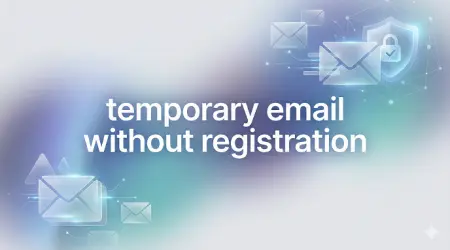

What Are the Limitations of Temp Mail? Hidden Drawbacks You Should Know
Introduction: Understanding Temporary Email Services
Temporary email services, sometimes known as temp mail, are temporary email services that provide you with an email address without using your own. On the surface, they seem like an ideal solution for registering on websites, stopping spamming, and maintaining anonymity on the internet. However, as convenient as they are, temp mail has several limitations that can be extremely problematic if you're not careful.
We will discuss in this article what temp mail actually is, why people use it and the important limitations you should be aware of before using it.
Why People Use Temp Mail in the First Place
Quick Sign-Ups and Instant Access
The majority of individuals use temp mail to register to a site quickly without having to submit their authentic email. In a few seconds, you can create a random inbox.
Protecting Primary Email from Spam
The greatest benefit of temp mail is that it allows your primary mail inbox to be spam-free of marketing messages, newsletters, and junk mail.
Anonymity and Privacy Benefits
The privacy provided by temp mail also is an added advantage, as you do not have to disclose your identity whenever you register on new web sites.
The Hidden Limitations of Temp Mail
Short Lifespan of Temporary Inboxes
The inboxes are deleted after 10 minutes to 48 hours by most of the temp mail services. That is to say, you will not receive an email later by a service.
Lack of Password Recovery and Security
By using a temp email to create an account, it is impossible to get the password back as you no longer have the inbox.
Not Suitable for Long-Term Communication
One-time use is the only purpose of temp mail. It is not perfect in terms of long-term work, business discussions, professional work.
Risk of Data Loss and Account Deletion
Since temp mailboxes disappear, you can lose valuable information by making the mistake of linking them to important accounts.
Practical Limitations in Everyday Use
Inability to Receive Important Emails Later
With temp mail, you will not receive a follow-up confirmation, update, or security alarm sent by a company.
Blocked by Certain Websites and Services
Disposable emails are blocked on many websites today, so one cannot use temp mail to sign-up.
No Customer Support or Ownership
You do not have any recovery, support, or ownership of your inbox like in Gmail or outlook.
Vulnerability to Cybersecurity Risks
Given that the temp mail addresses are not always confidential, they may be corrupted by hackers or used to commit fraud.
Security Concerns with Temp Mail
Shared Inboxes and Public Access
Your emails are not private and some temp mail boxes could be accessed by any person with the same address.
Phishing and Scams Through Disposable Emails
Temp mail is also unsafe since hackers and spammers use it to deliver dangerous links or phishing scams.
Comparing Temp Mail with Regular Email
Features You Miss Out On
Unlike permanent email accounts, temp mail lacks:
- Contact storage
- Calendar integration
- Cloud storage
- Encryption options
Why Free Email Providers May Be a Better Option
More trustworthy free providers such as Gmail, Yahoo and Outlook also offer spam filters, recovery and long-term access.
When Should You Avoid Using Temp Mail?
Financial Accounts and Online Banking
Do not use temp mail with banking, investment, or payment platforms, you are likely to lose this access forever.
Subscription Services and Paid Platforms
Billing and support of streaming platforms, SaaS tools, or accounts in cloud storage use permanent emails.
Professional or Business Communications
Working through temp mail will render you as unprofessional and unreliable.
Safer Alternatives to Temp Mail
Encrypted Email Services
Privacy conscious providers permanently retain accounts in ProtonMail and tempamili.com.
Alias Email Accounts
There are also providers that allow you to create email aliases and send messages to your primary mailbox, but hide your real one.
VPNs and Privacy Tools
You can use a VPN in addition to a secure email provider to be more anonymous instead of temp mail.
FAQs on Temp Mail Limitations
Q1: Does I use temp mail to use with social media accounts?
No. The majority of social sites block temporary mail and you stand a chance of losing your access once you forget your password.
Q2: Can temp mail be used online to shop?
Not at all. You can lose receipts, shipping notices or recover accounts.
Q3: Are logs of my activity maintained by the temp mail services?
Some do. You have no control over the servers, therefore, you can not be assured of privacy.
Q4: Why is it not possible to log into a temp mailbox later?
Since they are programmed to self-destruct in some time.
Q5: What is the largest risk of temp mail?
Being locked out of valuable accounts or your emails are left in the hands of people.
Q6: What can be safe as an alternative to spam protection?
Use an alias email address or use a different Gmail account used for sign-ups.
Conclusion: Should You Rely on Temp Mail?
One-time sign-ups and spam avoidance Temp mail is not an ideal solution, but it does the job. Its limited life span, insecurity and incompetence in long term communication makes it dangerous to use other than temporarily.




